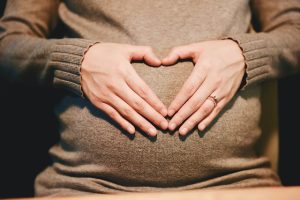Maternal selenium status declines sharply during pregnancy. In selenium-poor regions of the world, the mother’s normal everyday intake of selenium is not adequate to meet the additional needs of the fetus. In such circumstances, maternal selenium status can reach critically low levels. Meanwhile, selenium supplementation has shown positive effects on the immune system, especially in pregnancy [Schomburg 2021].

In a letter to the Deutsches Ärzteblatt International, Mücke et al urge that doctors pay extra attention to the selenium status of patients in stressful situations, e.g., pregnancy, chronic or acute illness, or convalescence. They note that there is a clear risk of selenium deficiency during pregnancy. Also after giving birth, new mothers living in selenium-poor regions will likely need selenium supplementation. They will likely need extra selenium to cope with the challenging post-partum conditions [Mücke 2021; Schomburg 2021].
Note: The Deutsches Ärzteblatt International is a peer-reviewed English-language medical journal with selected articles for an international audience.
Selenium Supplementation and Pregnant Women Low in Selenium
During pregnancy, the pregnant woman transfers increasing amounts of selenium from her body to the growing fetus. Consequently, the woman’s selenium status deteriorates if her daily intake of selenium does not increase. Later, the mother’s low selenium status may worsen because of breastfeeding. In regions and in circumstances in which the selenium supply is low, there may be negative health effects for both mother and child [Schomburg 2021].
Following a pregnancy, the autoimmune disorder postpartum thyroid disease is a danger for women low in selenium. Researchers in Italy conducted a randomized controlled trial in which they enrolled and monitored 2,143 pregnant women with normal thyroid function. During the women’s pregnancy and the postpartum period, the researchers administered 200 mcg/day selenium or placebo. The study results showed that the incidence of postpartum thyroid disease and permanent hypothyroidism was reduced by almost twofold in the selenium supplementation group compared with the placebo group. The Italian researchers concluded that selenium supplementation during pregnancy and in the postpartum period reduced thyroid inflammatory activity and reduced the incidence of hypothyroidism [reported in Schomburg 2021].
Selenium supplementation is particularly relevant to pregnant women and new mothers with known low selenium intakes, e.g., women on vegan diets. The reported median serum selenium status of vegans in Germany (68 mcg/L) is critically low. The low concentration indicates sub-optimal supply and inadequate biosynthesis of important selenoproteins such as the selenium transport protein selenoprotein P and the antioxidant selenoenzymes, the glutathione peroxidases [Mücke 2021]. To date, a serum selenium status of 120-130 mcg/L is the best estimate for optimal selenium intake and for the saturated expression of the selenoprotein P. Saturation of selenoprotein P corresponds to a sufficiently high selenium status [Schomburg 2021].
Selenium Deficiency and Morbidity and Mortality
Selenium deficiency is an established risk factor for infections and autoimmune diseases. Poor selenium status is associated with significantly increased all-cause and cause-specific mortality risk [Cui 2025].
Conclusions: Selenium Status during pregnancy
Selenium status in pregnant and breastfeeding women needs to be monitored carefully.
In selenium-poor regions, selenium deficiency is a risk factor in stressful situations such as pregnancy, chronic or acute illness, and convalescence.
Especially during pregnancy, there is a high risk for selenium deficiency in the mother and the fetus.
The additional needs for selenium are not met by the mother’s everyday intake of selenium.
Sources
Cui et al. Associations of selenium status with all-cause and cause-specific mortality: a systematic review and meta-analysis of cohort studies. Redox Biology. 2025;103755,
Mücke R et al. Selenium status should be assessed. Dtsch Arztebl Int. 2021 Feb 26;118(8):133.
Schomburg L. Selenium deficiency due to diet, pregnancy, severe illness, or Covid-19-a preventable trigger for autoimmune disease. Int J Mol Sci. 2021 Aug 8;22(16):8532.
The information presented in this review article is not intended as medical advice. It should not be used as such.
